AI and Automation in Digital Marketing are reshaping the industry at an unprecedented pace. What once relied solely on human intuition and manual campaign management is now powered by intelligent systems that can think, learn, and optimize in real time.
The fusion of AI and automation is not just improving efficiency—it is redefining creativity, personalization, and the customer journey. From content generation to predictive analytics and chatbots, brands are leveraging AI to make marketing smarter, faster, and more human-centered than ever before.
[Insert Image: A futuristic digital marketing dashboard showing AI analytics and automation workflows]
Understanding the Power of AI and Automation in Digital Marketing
Before diving into applications, it is important to understand how AI and automation complement each other.
-
Artificial Intelligence (AI) acts as the brain. It processes vast amounts of data, identifies patterns, and makes intelligent decisions.
-
Automation serves as the muscle. It executes repetitive tasks, follows predefined rules, and reduces human effort.
When combined, they create intelligent automation—a system where machines not only perform tasks but also learn, predict, and optimize based on data insights.
The Rise of AI and Automation in Marketing
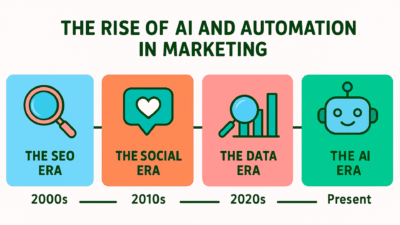
Revolution in Marketing
Digital marketing has evolved through several significant waves:
-
The SEO Era (2000s): Focused on keywords, backlinks, and search rankings.
-
The Social Era (2010s): Social media became the primary marketing battlefield.
-
The Data Era (2020s): Data-driven decisions became the standard practice.
-
The AI Era (Present): Automation, predictive intelligence, and hyper-personalization are driving innovation.
The combination of AI and automation marks a fourth revolution in marketing, where machines can understand customers better than marketers could on their own.
How AI is Transforming Core Pillars of Digital Marketing
1. Search Engine Optimization (SEO) Becomes Predictive
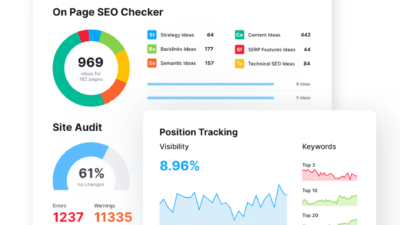
AI analyzing SEO performance metrics
Traditional SEO involved manual keyword research and content adjustments. Today, AI tools like Surfer SEO, Clearscope, and ChatGPT analyze top-ranking pages and user intent to suggest the most effective strategies.
AI doesn’t just help with ranking—it predicts what your audience will search for next.
Examples of AI in SEO:
-
Predictive keyword analysis using machine learning
-
Voice search optimization via natural language processing
-
Content gap identification using semantic search
-
Automated meta tags and schema generation
2. Data-Driven Decision Making
AI thrives on data. Platforms such as HubSpot, Marketo, and Salesforce Einstein use machine learning to analyze customer behavior, forecast trends, and suggest campaign optimizations.
Benefits include:
-
Smarter audience segmentation
-
Real-time campaign optimization
-
Predictive lead scoring
-
Personalized content delivery
Example: Netflix recommends shows not only based on viewing history but also on viewing patterns, duration, and skipping behavior. Similarly, digital ads and emails can be optimized based on user engagement trends.
3. Automation of Repetitive Marketing Tasks
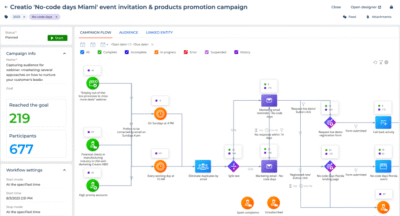
Marketer Monitoring Automated Workflows
Automation reduces manual workload. Email scheduling, lead nurturing, ad placement, and social media posting can all run automatically.
With AI, automation becomes intelligent. It learns which emails convert better, the optimal times for user engagement, and how to dynamically allocate budgets.
Examples:
-
Google Ads Smart Bidding adjusts bids automatically for maximum ROI
-
Mailchimp AI optimizes email send times for each recipient
-
Hootsuite AI recommends the best posting schedule
4. Hyper-Personalization at Scale
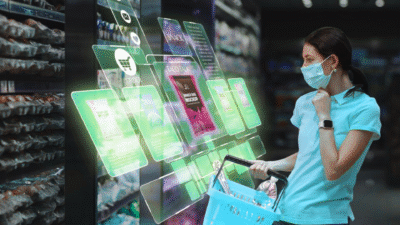
Shopping Experience with AI Recommendations
One-size-fits-all marketing is no longer effective. AI enables unique, personalized experiences for every user by analyzing behavior, purchase history, and browsing patterns.
Example: Amazon’s recommendation engine drives over 35% of sales through personalized product suggestions.
How it works:
-
AI analyzes browsing history, cart activity, and purchase behavior
-
Automation delivers tailored messages across multiple touchpoints
-
Continuous learning improves precision over time
5. Conversational AI and Chatbots
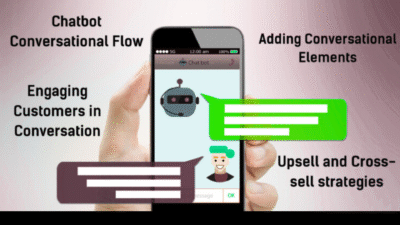
Chatbot Conversing with a User
AI-powered chatbots serve as 24/7 customer service and lead generation tools. Platforms like Drift, Intercom, and ManyChat use natural language processing to understand context, tone, and intent, creating human-like interactions.
Examples:
-
Sephora’s chatbot recommends makeup products based on selfies
-
Domino’s “Dom” bot allows pizza orders via text or voice
[Insert Image: Illustration of a chatbot conversing with a user on a website]
6. Predictive Analytics: Understanding Customers Before They Act
Predictive analytics uses AI to forecast customer behavior, such as who will buy, when, and what they might want next.
Applications:
-
Lead Scoring: Automatically identify high-value prospects
-
Churn Prediction: Detect users likely to drop off
-
Customer Lifetime Value (CLV): Estimate long-term worth
-
Ad Spend Optimization: Allocate budgets dynamically
Example: Spotify predicts listener preferences to curate personalized playlists based on listening patterns and emotional tone.
[Insert Image: Graph showing predictive customer behavior analysis]
7. Automated Content Creation and Curation
AI platforms like ChatGPT, Jasper, and Copy.ai generate blogs, captions, and ad copies that rival human writers. Automation tools can schedule content, tag it with keywords, and even curate articles from the web.
Example: A marketing team can plan a month’s content calendar in minutes by combining AI content generation with scheduling automation.
[Insert Image: AI writing assistant generating marketing content on a laptop]
8. Marketing Analytics and Attribution Simplified
AI-based analytics tools can map the entire customer journey and identify which touchpoints drive conversions, removing guesswork from multi-channel attribution.
Example: Google Analytics 4 (GA4) uses machine learning to fill in data gaps and provide smarter attribution models.
[Insert Image: Dashboard showing AI-powered marketing attribution model]
9. AI in Video and Visual Marketing
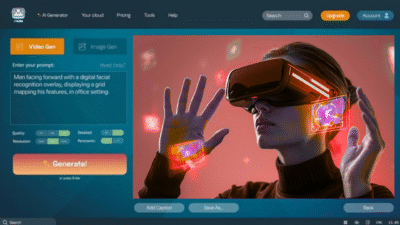
AI-generated video
AI tools can now create, edit, and optimize videos from text prompts. Platforms like Synthesia, Pictory, and Runway ML enable automated visual storytelling.
Use Cases:
-
Automated ad video generation
-
AI-based background removal and scene detection
-
Personalized video messages at scale
10. Integration of AI and Automation Across Channels
When AI connects email, SEO, social media, ads, and CRM data, it forms an intelligent marketing ecosystem. This ecosystem learns from every interaction, optimizing campaigns with every click and conversion.
Strategic and Future Impact of AI and Automation
AI in Content Creation and SEO Optimization
AI has transformed content creation from a labor-intensive task into a quick, intelligent process without compromising quality.
How marketers leverage AI:
-
Generate content ideas based on trending keywords
-
Optimize articles for semantic relevance
-
Automate meta titles and descriptions
-
Produce multiple ad copy variations for testing
Predictive Analytics: From Data to Foresight
AI-driven predictive analytics allows marketers to anticipate customer behavior rather than just react.
Key applications:
-
Lead Scoring
-
Customer Lifetime Value Prediction
-
Churn Analysis
-
Behavioral Targeting
Example: E-commerce platforms send timely purchase reminders or discounts based on predicted repurchase behavior.
AI in Programmatic Advertising
Programmatic advertising automates ad buying using AI to target audiences in real time. AI decides which ad to show, when, and to whom.
Benefits:
-
Reduced ad waste
-
Real-time optimization
-
Hyper-targeted segmentation
-
Higher ROI
Example: Google Display Network and Meta Ads Manager leverage AI-driven bidding systems that outperform manual campaigns.
Top AI and Marketing Automation Tools (2025 Edition)
| Category | Tool Name | Key Feature |
|---|---|---|
| AI Writing | Jasper, Writesonic, ChatGPT | Long-form content, ad copy |
| SEO Optimization | Surfer SEO, Clearscope | SERP analysis, keyword clustering |
| Email Automation | Mailchimp, ActiveCampaign | Personalized workflows |
| Social Media Automation | Buffer, Hootsuite, Later | Scheduling & analytics |
| Predictive Analytics | Salesforce Einstein, Pecan AI | Trend forecasting |
| Customer Support | Drift, Intercom | Conversational AI |
| Video Creation | Synthesia, Pictory | AI-generated video content |
Ethical and Strategic Challenges
Even with the power of AI, marketers face ethical dilemmas and strategic risks:
-
Data Privacy: AI depends on data, but laws like GDPR and CCPA require consent, transparency, and secure storage.
-
Over-Automation: Too much automation may strip campaigns of authenticity.
-
AI Bias: Algorithms trained on biased data can produce unfair outcomes.
-
Creative Dependence: Over-reliance on AI can reduce originality and brand identity.
The Future of AI and Automation
-
Predictive Personalization: Brands anticipate customer needs before they arise.
-
AI-Powered Voice and Visual Search: Optimization for voice commands and visual queries will become essential.
-
Autonomous Campaign Management: AI tools will create, run, and optimize campaigns end-to-end.
-
AR/VR Integration: AI-driven immersive experiences will redefine brand engagement.
-
Emotion AI: AI will analyze tone and mood to tailor interactions.
-
AI-Powered Storytelling: Marketing campaigns will dynamically adapt content based on user interests and emotions.
Preparing for the AI-Driven Marketing Future

Marketers collaborating with AI assistants in modern office
-
Upskill in AI Literacy: Understand tools, algorithms, and data insights.
-
Build a Smart Tech Stack: Integrate automation, analytics, and personalization tools.
-
Prioritize Data Ethics: Ensure transparency and consent in data collection.
-
Embrace Human-AI Collaboration: Use AI for execution while humans maintain creativity and strategy.
Case Studies: AI and Automation in Action
-
Starbucks (DeepBrew AI): Personalized mobile app offers based on purchase history, weather, and location.
-
Nike (Predictive Analytics): Forecasts demand and personalizes recommendations.
-
Washington Post (Heliograf): AI generates news summaries, freeing journalists for deeper reporting.
Final Thoughts
AI and automation are no longer optional—they are essential for digital marketing success. Their power lies not in replacing humans, but in amplifying creativity and insight.
Marketers who combine AI intelligence with human strategy will build brands that are remembered, not just seen.
Frequently Asked Questions (FAQ)
1. What is the role of AI and automation in digital marketing?
They optimize processes, analyze customer data, and improve personalization, enabling smarter campaigns, automation, and predictive insights.
2. How is AI changing traditional marketing strategies?
AI shifts decisions from intuition-based to data-driven, predicting trends, personalizing experiences, and optimizing campaigns in real time.
3. What are examples of AI tools in digital marketing?
Jasper, ChatGPT (content); Surfer SEO, Clearscope (SEO); Mailchimp, HubSpot (email); Buffer, Hootsuite (social); Google Ads Smart Bidding; Drift, Intercom (chatbots).
4. How does AI improve SEO performance?
By understanding search intent, generating topic clusters, optimizing content, analyzing competitors, and identifying voice search opportunities.
5. What is predictive analytics in marketing?
It uses historical data to forecast customer behavior, improving lead scoring, churn prediction, and ad placement strategies.
6. Can AI replace human marketers?
No. AI handles automation and data analysis, but humans provide creativity, strategy, and emotional intelligence.


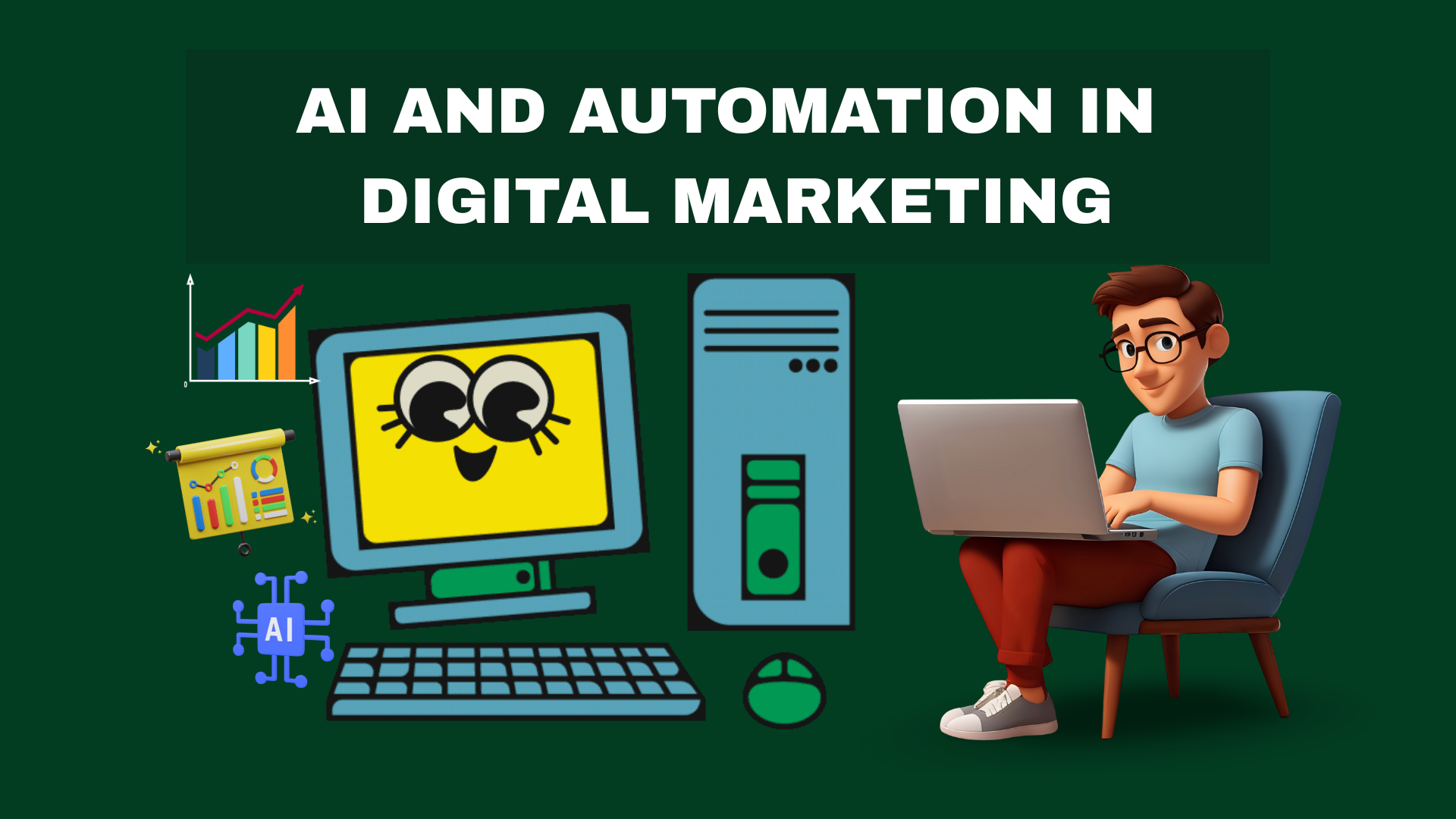
Great information shared.. really enjoyed reading this post thank you author for sharing this post .. appreciated
nice